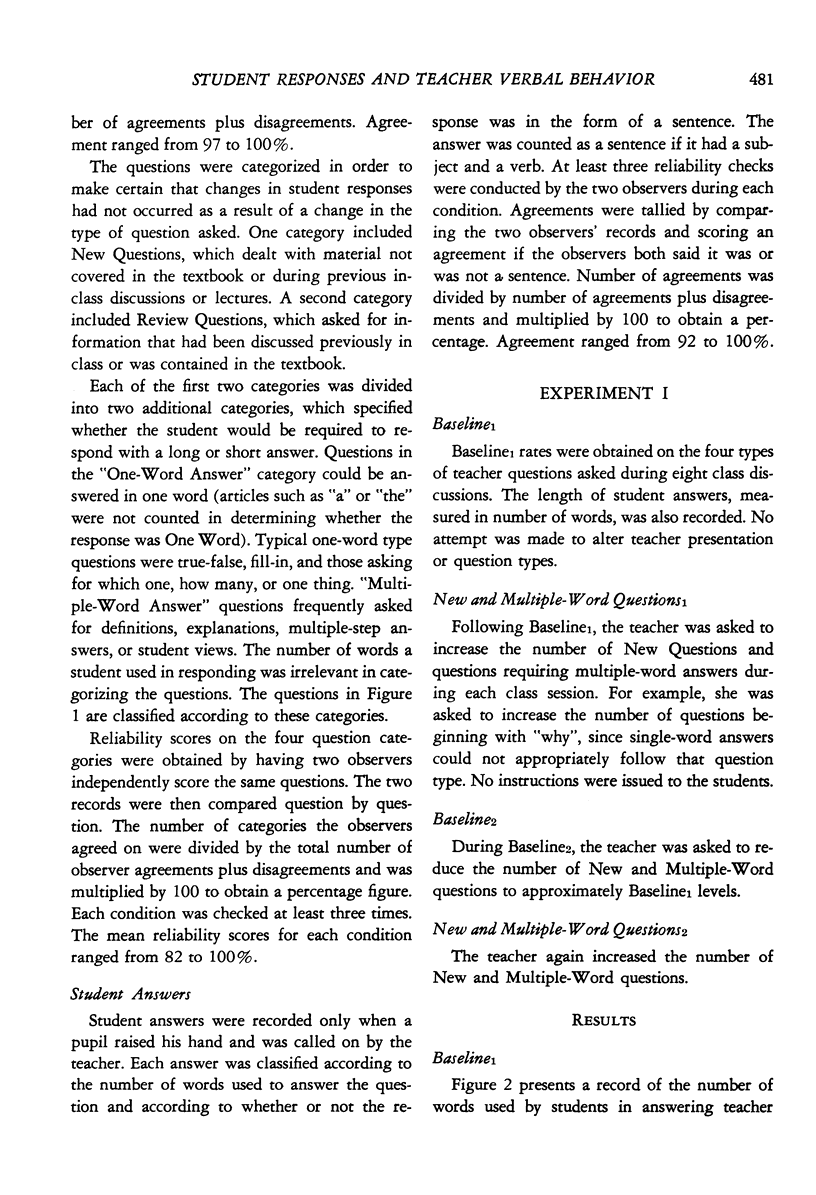Abstract
Two experiments were conducted in a junior-high special-education class of eight pupils in an inner-city school. In the first experiment, the teacher doubled the number of words used by the pupils in answering questions by altering the type of questions asked. In the second experiment, the number of words used by students and the percentage of answers given in complete sentences, increased from less than 5% to approximately 90% when the teacher instructed the pupils to answer in complete sentences and asked another pupil to answer using a sentence if the first one did not do so. In both experiments, a brief return to baseline conditions brought a return to low levels of verbal responding. An analysis of which pupils were called on by the teacher, teacher praise, and in the second experiment the types of questions asked, indicated that these variables were not responsible for the increases in verbal responding.
Keywords: language, verbal behavior, questions, sentences, instruction, special-education classes, junior high school students
Full text
PDF








Selected References
These references are in PubMed. This may not be the complete list of references from this article.
- Broden M., Hall R. V., Mitts B. The effect of self-recording on the classroom behavior of two eighth-grade students. J Appl Behav Anal. 1971 Fall;4(3):191–199. doi: 10.1901/jaba.1971.4-191. [DOI] [PMC free article] [PubMed] [Google Scholar]
- Hall R. V., Fox R., Willard D., Goldsmith L., Emerson M., Owen M., Davis F., Porcia E. The teacher as observer and experimenter in the modification of disputing and talking-out behaviors. J Appl Behav Anal. 1971 Summer;4(2):141–149. doi: 10.1901/jaba.1971.4-141. [DOI] [PMC free article] [PubMed] [Google Scholar]
- Hart B. M., Risley T. R. Establishing use of descriptive adjectives in the spontaneous speech of disadvantaged preschool children. J Appl Behav Anal. 1968 Summer;1(2):109–120. doi: 10.1901/jaba.1968.1-109. [DOI] [PMC free article] [PubMed] [Google Scholar]
- Madsen C. H., Becker W. C., Thomas D. R. Rules, praise, and ignoring: elements of elementary classroom control. J Appl Behav Anal. 1968 Summer;1(2):139–150. doi: 10.1901/jaba.1968.1-139. [DOI] [PMC free article] [PubMed] [Google Scholar]
- Packard R. G. The control of "classroom attention": a group contingency for complex behavior. J Appl Behav Anal. 1970 Spring;3(1):13–28. doi: 10.1901/jaba.1970.3-13. [DOI] [PMC free article] [PubMed] [Google Scholar]
- Reynolds N. J., Risley T. R. The role of social and material reinforcers in increasing talking of a disadvantaged preschool child. J Appl Behav Anal. 1968 Fall;1(3):253–262. doi: 10.1901/jaba.1968.1-253. [DOI] [PMC free article] [PubMed] [Google Scholar]


